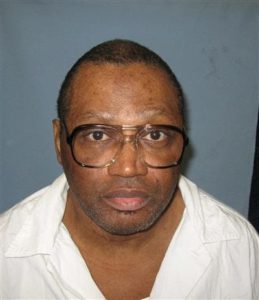
Vernon Madison, 65, Alabama Death Row Inmate.
Death row inmate Vernon Madison is scheduled to die by lethal injection at an Alabama correctional facility tonight, after a federal judge denied an emergency stay of execution.
Attorneys with the Equal Justice Initiative filed the request Wednesday at the U.S. District Court Southern District of Alabama in Mobile.
“Mr. Madison suffers from dementia, has no independent recollection of the offense he was convicted of and consequently does not have a rational understanding of why the State of Alabama is attempting to execute him,” the emergency motion stated.
Attorneys argued the execution would violate Madison’s Eighth and 14th Amendment rights because he is mentally incompetent to stand trial.
Madison was arrested and charged for the murder of Mobile police officer Julius Schulte in April 1985. Schulte, a corporal for the Mobile Police Department, was fatally wounded by Madison while responding to a domestic disturbance call, officials said.
By September of that year, a jury had found him guilty of capital murder and sentenced Madison to death in trial court. However, the conviction and sentence were thrown out after an Alabama appeals court found that prosecutors had illegally discharged African-American jurors due to race.
The State fared no better at a second trial in 1990, as the resulting conviction and death sentence were reversed on the grounds that prosecutors had obtained expert testimony based on illegal evidence.
A jury sentenced Madison to life without the possibility of parole in his final trial, and presiding Judge Ferrill McRae overrode that decision to sentence Madison to death for a third time.
EJI reports the Mobile County Circuit judge has overridden six life without parole jury verdicts and cites U.S. Supreme Court Justice Sonia Sotomayor’s dissent in the Hurst v. Florida case in January.
Sotomayor criticized Alabama’s legacy of judicial override and named McRae as one of the state’s biggest offenders. Sotomayor said he “campaigned by running several advertisements voicing his support for capital punishment” and said the actions of McRae and others “cast a cloud of illegitimacy over the criminal justice system: Alabama judges, who are elected in partisan proceedings, appear to have succumbed to electoral pressures.”
The Court ruled Florida’s practice of judicial override unconstitutional in an 8-1 vote.
“The Sixth Amendment protects a defendant’s right to an impartial jury,” Sotomayor wrote. “This right required Florida to base Timothy Hurst’s death sentence on a jury’s verdict, not a judge’s factfinding. Florida’s sentencing scheme, which required the judge alone to find the existence of an aggravating circumstance, is therefore unconstitutional.”
EJI attorneys filed an additional motion with the Alabama Supreme Court in light of the Hurst case and another Alabama death penalty case under review by the U.S. Supreme Court.
The state Supreme Court denied the stay of execution Wednesday, but that decision can be appealed to the U.S. Supreme Court.
AL.com reports the execution is scheduled for 6 p.m. at the Holman Correctional Facility in Atmore.
Madison will become the second person executed after the state modified its lethal injection admixture more than two years ago and the state’s 58th execution since 1983, when Alabama resumed capital punishments following the federal ban.


